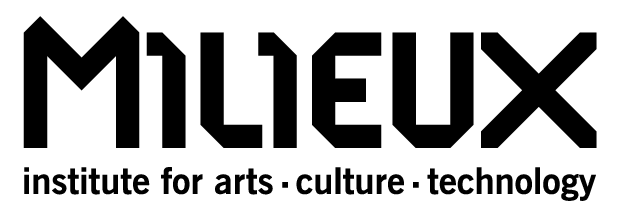
- This event has passed.
Imagining an AI Commons: A One-Day Workshop on AI and the Commons
2019-12-06 | 09:00 - 16:00

Hosted at Machine Agencies, Milieux Institute, Concordia University
How can artificial intelligence be oriented toward the common good? The belief in AI for good has widespread acceptance in the industry and among governments. Declarations from around the globe—Canada, China, South Korea, France, and more—call for the development of AI to have a social purpose. But what is that purpose?
The workshop seeks to develop a vision for a commons-based approach to the future of AI. It is an intervention to develop democratic approaches to digital disruption and understand transformations in citizen engagement. The workshop will produce a public report on the possibility of an AI as well as a series of video interviews capturing the discussion.
Without clear direction, AI risks becoming privatized and at odds with a common world. In a recent study, researchers calculated the costs of training a deep neural network model for use in natural language processing. Their findings are alarming. The energy required can result in CO2 emissions equal to the lifetime emissions of five cars. Meanwhile, the financial cost of the computing needed to carry out this research has become so high that academic researchers cannot participate, enclosing AI innovation within the profit-oriented technology industry.
A commons approach to AI seeks to mitigate these harms, just as commons approaches in other areas have intervened in environmental devastation and the privatization and commodification of knowledge. The term “commons” was initially rooted in theories about the conditions and consequences of sharing resources. But theorists and activists have worked to broaden it, naming new commons in order to advocate for their protection while developing praxis to govern them. This shift in understanding has been greatly informed by indigenous scholarship and indigenous people’s histories, epistemologies, and practices, which offer a wealth of approaches to the management and preservation of common resources, material and otherwise.
In this workshop, we invite you to reflect broadly on artificial intelligence and its relation to the commons as you consider the following questions:
- What should an AI Commons be?
- How could a commons-based approach guide the development of AI?
- How does a commons approach differ from proposed ethical or rights-based frameworks?
- How could the development of AI today—including the infrastructure and knowledge at its foundation—become a commons?
- What forms of collective action and governance would be necessary? What movements and efforts already exist?
- What latent commons or undercommons might we find in thinking about AI?
- Could AI reshape how we think about the commons, leading to new theories or practices?
- How might related (or unrelated) approaches to the commons be understood through AI and the commons (e.g., making kin, new materialism, infrastructures of care, or platform cooperativism)?
- What histories and instances of the commons does an AI commons require for context and inspiration?
- How might we imagine a future common world for the machines, environments, humans, and other life drawn together by the industrial efforts around AI?
- How can humans, AI, and other agents collaborate equitably in these commons?
- How might AI reproduce sustainably within the natural commons, unseating extractive and settler approaches to common worlds?
We invite people from diverse professions and communities to contribute as either a workshop participant or a speaker. Participants are expected to prepare a short 500-word position statement on one of these questions to be shared before the workshop then workshopped in groups to draft a shared response to these questions to be integrated into a public position paper. Speakers are expected to prepare a short 15-minute presentation, participate in a roundtable and animate around 1-2 of these questions.
The workshop is invite-only. Some travel funds will be available for speakers.
This workshop is supported by the Social Sciences and Humanities Research Council of Canada, the Center for the Study of Democratic Citizenship and the Milieux Institute for Arts + Technology at Concordia University.
